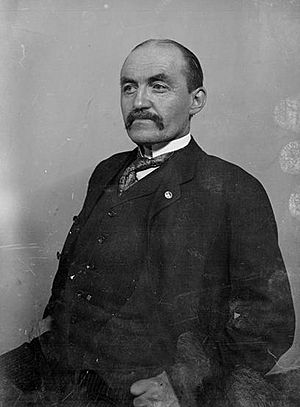Honoré Jackson facts for kids
Quick facts for kids
Honoré Jaxon
|
|
|---|---|

Honoré Jaxon, 1907, Chicago
|
|
| Born | May 3, 1861 Toronto, Canada West
|
| Died | January 10, 1952 (aged 90) |
| Nationality | Canadian |
| Citizenship | Canadian |
| Education | University of Toronto |
| Employer | Louis Riel |
| Known for | Secretary to Louis Riel during the North-West Rebellion in Canada, participant in Coxey's Army |
| Spouse(s) | Aimée |
William Henry Jackson (born May 3, 1861 – died January 10, 1952) was an important person in Canadian history. He was also known as Honoré Jackson or Jaxon. He worked as a secretary for Louis Riel during the North-West Rebellion in Canada in 1885. He was married to Aimée, who used to be a teacher in Chicago.
Contents
Early Life and Education
William Henry Jackson was born in Toronto, Canada West. His family followed the Methodist religion. A few years later, his family moved to a town called Wingham, Ontario.
Jackson went to the University of Toronto for three years. However, he could not finish his last year of studies. This was because his father faced financial difficulties.
Joining the Métis Cause
In 1881, Jackson moved to Prince Albert. This area was then part of the North-West Territories. There, he started to understand and support the Métis people. The Métis are a group of Indigenous people with mixed European and Indigenous ancestry. They were struggling against the Canadian government for their rights and land. Even though Jackson was not Métis himself, he felt strongly about their cause.
Jackson became the personal secretary to Louis Riel. Riel was a leader of the Métis people. He had returned to Canada in 1884. Jackson and Riel worked together. They helped organize a Métis group and planned to set up their own local government.
The North-West Rebellion
Open fighting began between the Métis and the North-West Mounted Police. The police were joined by quickly gathered soldiers. This conflict started on March 18, 1885, at the Battle of Duck Lake.
On that same day, March 18, 1885, Jackson became a Catholic. Father Fourmond performed the baptism ceremony. Louis Riel was his godfather. Riel gave him the new name "Honoré Joseph Jaxon." The very next day, Riel announced that a provisional government had been formed. This government was called the Exovedate.
Challenges During the Rebellion
The events of the rebellion and his religious experience affected Jackson. Within a few days, Riel decided to hold Jackson. Riel might have thought Jackson was acting strangely. He also worried that Jackson's unique religious ideas and his support for Henry George's ideas about land ownership might cause problems among his followers. Later during the rebellion, Riel released Jackson.
After the Rebellion
Canadian government troops eventually defeated the Métis. The last major battle was the Battle of Batoche, which ended on May 12, 1885. Jackson was captured after this battle.
He was put on trial for treason. This means he was accused of betraying his country. However, the court found him not guilty. This was because of his mental state at the time. He was sent to a special hospital near Winnipeg, Manitoba.
On November 2, he managed to escape from the hospital. He then fled to the United States.
Life in the United States
Once in the United States, William Henry Jackson changed his name to Honoré Jaxon. He became involved in the labour union movement in Chicago, Illinois. Labour unions work to protect the rights of workers. He was also active in groups that supported socialist ideas. These ideas focus on fairness and equality in society.
Jaxon also started telling people he was Métis, even though he wasn't. In 1894, he joined a group called Coxey's Army. This group marched to Washington, DC. They were demanding an eight-hour workday for everyone.
In 1897, he joined the Baháʼí Faith. This is a religion that teaches about unity and peace. After this, he became more interested in Canada again.
Later Years and Legacy
Honoré Jaxon returned to Canada for a short time between 1907 and 1909. During this visit, he interviewed people who had been part of the North-West Rebellion. He also spoke at meetings for workers and socialist groups.
He then went back to the United States and eventually moved to New York City. He started collecting many books, newspapers, and pamphlets. These items were all about the Métis people. His goal was to create a museum in New York to honor them.
However, as years passed, he became very poor and very old. On December 12, 1951, he was forced to leave his apartment. His large collection of materials was considered unimportant by the city. It was sold as waste paper. Honoré Jaxon died just one month later.
 | May Edward Chinn |
 | Rebecca Cole |
 | Alexa Canady |
 | Dorothy Lavinia Brown |

